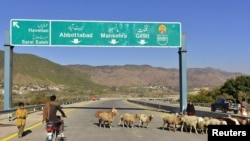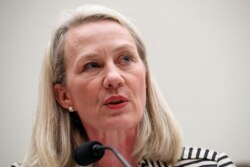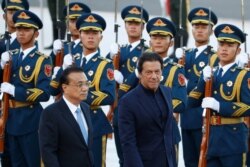China has defended its infrastructure development investments in Pakistan as "open and transparent," refuting renewed U.S. criticism of the ongoing multibillion-dollar economic collaboration under Beijing's global Belt and Road Initiative (BRI).
The Chinese embassy in Islamabad issued the rebuttal Wednesday in response to comments in Pakistani media attributed to a visiting senior U.S. diplomat questioning the transparency and fairness of projects being implemented in what is known as the bilateral China-Pakistan Economic Corridor (CPEC), a flagship of the trillion-dollar BRI.
"The entire process is open and transparent and is in line with the international norm. We keep in touch with the relative accountability agencies of Pakistan and it is agreed that the CPEC is clean," the Chinese diplomatic mission stressed in its statement.
'Debt trap' allegations
Principal Deputy Assistant Secretary of State Alice Wells, who visited Pakistan this week, was also quoted as saying the CPEC-related financing was burdening Pakistan with expensive Chinese loans. She had raised similar concerns and questions while delivering a public speech in Washington last November.
Critics in the U.S. and elsewhere see China's BRI program as a "debt trap" for countries like Pakistan, which have struggling economies that would make it difficult for them to make Chinese loan repayments.
"The U.S. keeps fabricating the so-called debt story, their mathematics is bad, and their intention is worse," the Chinese Embassy asserted. "China has never forced other countries to pay debts, and will not make unreasonable demands on Pakistan."
China has invested around $30 billion, mostly in direct foreign investment, over the past five years in early harvest CPEC projects. The investment has significantly improved local transportation infrastructure and constructed power plants, effectively ending crippling nationwide electricity shortages.
'Rock-solid' ties
Chinese and Pakistani officials say the economic collaboration has also created more than 75,000 jobs directly for locals and contributed 1%-2% of the GDP growing in Pakistan.
The Chinese embassy cited the Pakistani central bank's statistics, saying the total foreign debt of Pakistan stood at $110 billion, with Western financial institutions, including the Paris Club and International Monetary Fund (IMF), being the largest creditors of the country.
"Loan for the CPEC is about $5.8 billion, accounting for 5.3% of Pakistan's total foreign debt, with a repayment period of 20-25 years and an interest rate of approximately 2%," the Chinese statement noted. The repayments will start in 2021, with annual repayments of about $300 million, it explained.
The embassy alleged the "negative propaganda" against CPEC by the U.S. was aimed at undermining Beijing's close relationship with Islamabad.
"China-Pakistan ties are rock-solid and unbreakable. China will continue to work with the Pakistani government and people to steadily advance the BRI and CPEC to promote regional peace and development," stressed the Chinese statement.
CPEC has also built and opened Pakistan's strategically located deep-water Arabian Sea port of Gwadar, which is being operated by a Chinese state company.
U.S.-Pakistan talks
U.S. diplomat Wells during her four-day visit to Islamabad this week, which officially ended Wednesday, held extensive talks with senior Pakistani officials, focusing on boosting bilateral trade and investment ties. Her trip took place amid Islamabad's warming relations with Washington stemming from recent joint efforts aimed at ending the war in Afghanistan, America's longest.
U.S. President Donald Trump met with Pakistani Prime Minister Imran Khan on Tuesday on the sidelines of the World Economic Forum in Davos, the third interaction between the two leaders since their July 2019 White House meeting.
"We're getting along very well. I would say we've never been closer with Pakistan than we are right now. And that's a big statement," Trump acknowledged while speaking to reporters before his meeting with Khan.
Pakistani officials say they want to enhance commercial ties with the U.S. but will not "compromise" on Islamabad's relations and CPEC commitments with China.






